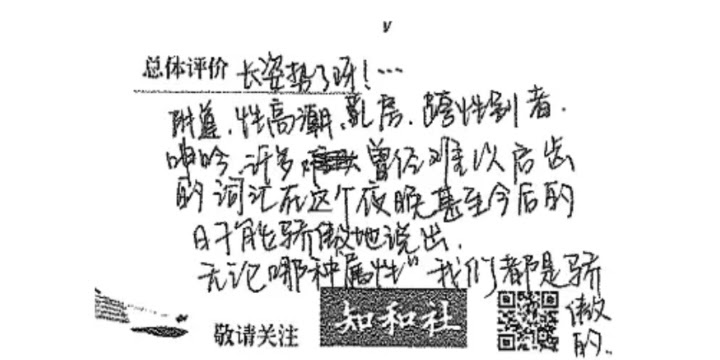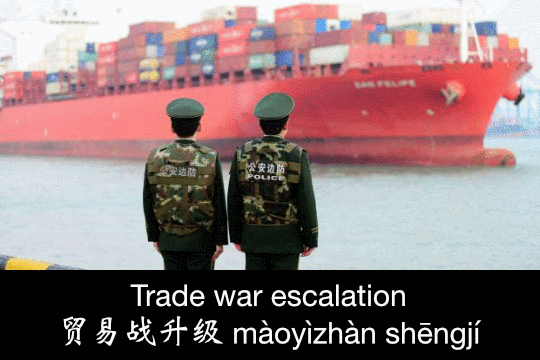The U.S. has ‘ignited a trade war’


Dear Access member:
Six things for you at the top today, ranging from trade war (it’s been “ignited,” says the Chinese foreign ministry) to China news from one of the world’s most messed-up countries: the poor, chaotic, violent Central African Republic.
Have a great weekend, and don’t hesitate to send me words of praise or condemnation by email (jeremy@thechinaproject.com) or on our Slack channel.
Other announcements for Access members:
-
Read our Access Q&A with Joanna Chiu, chair of Nüvoices, that happened this week on June 12 as a handy PDF downloadable from our Slack channel.
-
Watch the video recording of our Women’s Conference last month via this private Youtube link.
—Jeremy Goldkorn, Editor in Chief
1. The U.S. has ‘ignited a trade war’
The trade war is on:
-
“President Donald Trump has approved tariffs on Chinese goods worth about $50 billion…ratcheting up a confrontation on trade with Beijing and triggering losses in the domestic stock market,” according to Bloomberg.
-
“My great friendship with President Xi of China and our country’s relationship with China are both very important to me. Trade between our nations, however, has been very unfair, for a very long time.” That is how Trump begins his presidential statement on the tariffs.
-
A list of “products imported from China that will be subject to additional tariffs as part of the U.S. response to China’s unfair trade practices related to the forced transfer of American technology and intellectual property” was today released by the Office of the United States Trade Representative (USTR).
-
“The U.S. tariffs will fall on 1,102 categories of Chinese goods, a list that generally focuses on industrial sectors that relate to the country’s Made in China 2025 plan for dominating high-tech industries,” according to the New York Times (paywall).
-
“It is deeply regrettable that in disregard of the consensus between the two sides, the U.S. has demonstrated flip-flops and ignited a trade war. This move not only hurts bilateral interests, but also undermines world trade order.” That was the response from the Chinese foreign ministry.
-
The Ministry of Commerce announced (in Chinese) that China will levy reciprocal taxes of 25 percent on imported product categories that were worth about $34 billion in 2017 (list in Chinese), and on commodities such as chemicals, medical equipment, and energy products that were worth $16 billion in 2017 (list in Chinese).
-
Meanwhile, Chinese regulators have approved U.S. semiconductor company Qualcomm’s planned $44 billion acquisition of Dutch chipmaker NXP Semiconductors, says the South China Morning Post. Antitrust regulators from China were the last of nine countries to sign off on the deal, and its approval has been seen as a bargaining chip in trade talks.
-
Markets slid slightly by close on Friday, but the New York Times notes (paywall) that the overall health of the U.S. economy — and stimulus from both federal tax cuts and increased government spending — are keeping investors from being too pessimistic, for now at least.

2. HPV vaccine tourism
Most cases of cervical cancer — and several other cancers of the tender bits of both men and women — are linked to infections of the human papillomavirus (HPV). The first HPV vaccine became available in 2006. By last year, 71 countries included it in routine vaccinations for girls, and the vaccine is on the World Health Organization’s List of Essential Medicines.
-
The vaccine only became commercially available in China in 2017. Its arrival on the market created awareness about the vaccine and demand has far outstripped supply.
-
Chinese women are traveling to Hong Kong, South Korea, Singapore, and Malaysia to get vaccinated, according to the Financial Times (paywall).
-
About two million Chinese women have traveled to Hong Kong for HPV vaccinations annually in recent years. At least 26 million Chinese women will seek HPV vaccination in the next few years, according to an analyst quoted by the FT.
-
Three trips to Hong Kong for HPV injections cost HK$4,500 ($570), one woman told the FT, while another source said prices had gone up 20 percent to HK$5,500 in the past year.
-
HPV vaccine Gardasil, made by U.S. company Merck, went on sale this year in China. Demand “outstrips supply by 30 to 1 at clinics in Shanghai, with some health center waiting lists stretching beyond six months,” according to the FT.
-
About 20 women protested outside Merck’s Hong Kong office earlier this month, “condemning the company for shortages that prevented them from completing a full course of three inoculations.” Merck said supply constraints will continue for the rest of the year.
-
Shortages in Hong Kong mean that Chinese medical tourists will look to neighboring countries. The FT mentions South Korea, Malaysia, and Singapore.
—Jeremy Goldkorn

3. Why does the Central African Republic want Chinese guns?
The United Nations has several peacekeeping operations on the African continent, and China has become increasingly active in them in recent years. A quick introduction to the topic can be found on Quartz: China in Africa: China’s vision of itself as the world’s peacekeeper starts in Africa. For a more detailed look at China’s interests in African security, see this paper in African Studies Quarterly by Lina Benabdallah — a scholar who was also interviewed on the Sinica Podcast about China-Africa relations broadly.
One peacekeeping operation in particular, the United Nations Multidimensional Integrated Stabilization Mission in the Central African Republic (MINUSCA), has been in place since 2014, a year after the country descended into violence due to a coup, and has deployed around 12,000 troops and police.
The Central African Republic is now requesting Chinese arms for MINUSCA. A lot of them. But France, the U.S., and Britain are not so keen on this development, and have put a stop to it at the UN Security Council. AFP reports:
-
CAR Defense Minister Marie Noelle Koyara “asked a UN sanctions committee on June 5 to grant an exemption to an arms embargo,” which has been in place since the 2013 coup.
-
China’s Poly Technologies, an arms supplier, “wants to donate military equipment which includes 12 armoured vehicles and four assault vehicles, 50 pistols, six sniper rifles, 10 submachine guns with silencers and some 30 machine guns of various calibres…also…300 rockets, 500 anti-tank grenades, some 725,000 rounds of ammunition of various types and 15,000 tear gas grenades.”
-
CAR argues that these arms are necessary to pump up state power. According to the Defense Post, the “government controls around a fifth of the Central African Republic and relies heavily on Minusca for support. The rest is controlled by at least 14 different militia groups…who often fight each other for control of revenue from extortion, roadblocks or mineral resources.”
-
France is concerned that many of the weapons are too lethal for the purposes of the peacekeeping mission, while the U.S. questioned the request for rockets and anti-aircraft equipment while there is “no threat of an air attack,” and Britain “said it was concerned that the shipments would pass through Cameroon unescorted.”
-
The CAR is “a geopolitical chess game,” a UN official told AFP last month, as China works to promote its interests there after Russia gained the first exemption to the arms embargo last year. China has “scrapped $17bn worth of debt, set up a programme to train government officials in China, and donated military material,” all in the last six months, but this recent offer of military arms is China’s most significant attempt to move into the heart of the CAR’s security challenge.
—Lucas Niewenhuis

4. ‘The Vagina Monologues’ and failed urban design
What is China reading this week? The second installment of our new column Chinese Corner is out. Jiayun Feng introduces a variety of recent, popular Chinese writing, including:
-
After the prestigious Fudan University canceled an annual performance of the feminist play The Vagina Monologues (阴道独白 yīndào dúbái) for the first time in 14 years, one woman recalled her life-changing experience when she saw the play for the first time in 2013.
-
Thousands of baby girls from Changle, a district of Fuzhou in Fujian Province, were abandoned between the 1960s and the end of the 20th century. Many of them were sold as child brides. A journalist reports on some of these women who have tried to find their biological parents and deal with the trauma of abandonment.
-
Newsstands in the middle of sidewalks, roads too narrow to allow two people to walk side by side, glass floors that become dangerously slippery on rainy days: Design failures like these pose constant threats to urban residents in China, argues Li Dihua 李迪华, an architecture professor at Peking University.
Read this week’s Chinese Corner on The China Project.

5. Accountant steals 9.3 million yuan to woo camgirls
This is a very contemporary crime: A married male accountant in Zhenjiang, Jiangsu Province, has been sentenced to seven years in prison (in Chinese) after stealing a staggering 9.3 million yuan ($1.44 million) from his employer, a real estate company.
-
He used the money to pay camgirls on live-streaming platforms and ask them out in real life. Wang’s monthly salary was around 3,000 yuan ($466).
-
The company reported him to the police in February 2017 after an audit revealed the missing money. Police found Wang in a hotel in Shanghai where he had been consorting with a cam girl. He tried to slit his wrists, but the police interrupted him and arrested him.
-
Footage of live streamers was used in a news segment about Wang’s case on nationwide broadcaster CCTV. While their faces were blurred out, internet users still recognized the famous camgirl Féng Tímò 冯提莫. In this short live-streamed video (in Chinese), Féng Tímò admits that she had once spent time with Wang, and offers to return all the gifts she received from him.

6. Where to watch dragon boat races in Guangdong
Dragon boat racing, that quintessentially Chinese festive sport, never seemed very Chinese to me after living in arid northern China for two decades. But watery Guangdong Province is the heartland of dragon boating. If you’re in southern China around June 18 — the Dragon Boat Festival (端午节 duānwǔ jié) — That’s Magazine has a list of places and times where you can watch dragon boat races in Guangdong.
—–
Our whole team really appreciates your support as Access members. Please chat with us on our Slack channel or contact me anytime at jeremy@thechinaproject.com.
—Jeremy Goldkorn, Editor-in-Chief
 Here are the stories that caught our eye this week:
Here are the stories that caught our eye this week:
-
The aftermath of the Trump-Kim summit had all eyes on China, which managed to walk away with a series of unanticipated positive outcomes despite not being present. Although the official agreement featured only imprecise language about denuclearizing the Korean Peninsula, Trump later made remarks about ending joint exercises with South Korea and reducing troop counts on the peninsula. Additionally, Beijing’s role in transporting Kim to the summit and Trump’s praise for Xi Jinping’s role in the agreement have validated China’s role as a key player on North Korea.
-
The Chinese telecom giant ZTE faces an uncertain future as the U.S. Senate prepares to vote on legislation that would bar U.S. agencies from purchasing or leasing equipment from the company due to its “risky” nature. Senator Chris Van Hollen (D-Maryland), who supports the legislation, called ZTE “a multiple and flagrant violator of U.S. sanction laws” and equated the Trump administration’s deal with the company with a “slap on the wrist.”
-
Protestors in Vietnam were up in arms over draft legislation to create three special economic zones. While the proposed economic zones do not explicitly favor Chinese investment, protesters see Chinese companies as obvious candidates given China’s recent push into foreign markets and government initiatives such as the Belt and Road. This legislation has exacerbated pre-existing tensions from Beijing’s activity in Vietnamese-claimed regions of the South China Sea, as well as a recent chemical spill from a Taiwanese company.
-
Didi Chuxing, in a move that demonstrates more concern for its legal standing than women’s welfare, changed its ride-hailing platform to only allow same-sex rides at key hours in the night and early morning. This development comes after a driver murdered a young female customer using the service, as well as lots of misguided advice on how women should protect themselves from predatory drivers.
-
The American Institute in Taiwan officially reopened with a $250 million compound in northern Taipei, affirming the United States’ close relationship with the island despite Beijing’s protests. While no cabinet-level U.S. officials were present, figures in Taiwanese politics have expressed anticipation for hosting figures such as National Security Advisor John Bolton. AIT has served as the de facto American embassy following the end of formal U.S.-Taiwan relations in 1979.
-
Truck drivers in China attempted a strike over an Uber-like platform that allows contractors to bid on the lowest haulage rates, although they also have long-standing grievances ranging from high fuel prices to wage stagnation.

BUSINESS AND TECH:
-
Chinese smartphones in Africa
The Chinese smartphone maker you’ve never heard of is dominating the African market / TechNode
“TECNO, its sister brand itel and other TRANSSION devices make up nearly half the phones that are sold on the continent, according to company representatives.” -
Department of too many buzzwords: Baidu’s blockchain gambling game
Baidu’s new blockchain game allows you to gamble on the World Cup / Abacus
“Baidu is testing a new blockchain-powered game that allows you to build planets…and bet on the World Cup.” -
Toutiao enters gaming
Jinri Toutiao is going into games distribution / TechNode
Jinri Toutiao, the company famous for its AI-powered news aggregator, has a “data traffic advantage” that greatly boosts the user numbers of games it plans to distribute. TechNode says that “the market expects Jinri Toutiao’s total users to be around 100 million.” For more on Toutiao: 996 Podcast — Liu Zhen on Bytedance’s global vision and why Toutiao is unique; The China Project — Bytedance: Celebrating innovation while apologizing for its political crimes. -
On-demand bike problems
Residents demand action after deaths on bike-clogged Chinese road / SCMP
“Residents of a Beijing neighbourhood are calling on the authorities to clear an unmarked road clogged with share bikes and electric scooters after two people were mowed down and killed by a car in the area on Thursday, Chinese media report.” -
Short video upstart takes on Tencent
8 lessons from the rise of Douyin (Tik Tok) / TechNode
“WeChat now has a serious challenger whose meteoric rise has taken China by storm (and WeChat’s owner Tencent by surprise). That is Douyin (抖音, literally ‘shaking sound’ in Chinese), one of the most popular short video apps in China, as well as worldwide.” -
Global on-demand transport wars
China’s Didi Chuxing continues its international expansion with Australia launch / TechCrunch
“The Australia launch will again put Didi in direct competition with Uber, but that is becoming increasingly common… This move follows forays into Taiwan, Mexico and Brazil this year as Didi has finally expanded beyond its China-based empire.” See also CNBC: China’s Didi steps up challenge to Uber with plan to launch in Australia. -
Theme parks: China’s latest fool’s gold rush
China’s theme park biz heading for bumpy ride / Variety
“A promising new sector in entertainment has opened up in China, triggering a gold rush by eager U.S. companies from Hollywood and beyond…. In short, what happened with the film industry in China now seems to be repeating itself, this time with the theme-park business.” -
What privacy concerns?
Chinese consumers most willing to trade privacy for convenience / Sixth Tone
“The Digital Consumer Insights 2018 report classified Chinese internet users as ‘Digital Voyagers’ — those whose perceptions of fraud risks are outweighed by a desire for convenience.”
POLITICS AND CURRENT AFFAIRS:
-
Pompeo does damage control
Secretary of State Pompeo visits China, Japan, South Korea after summit / NPR
“In meetings with leaders of three countries in two different cities, Pompeo’s message was a much more sober one than that of his boss just hours earlier. After reassuring American allies Japan and South Korea this morning in Seoul, he flew to Beijing, where he said the U.S. would consider making a call to lift economic sanctions on the North. -
Taiwan, China, and the airlines
U.S. airlines unbowed by Beijing’s demand to call Taiwan part of China / WSJ (paywall)
“Most of the world’s airlines have bowed to Chinese demands to refer to Taiwan as part of China, but a handful of others — including the three main U.S. international carriers — have refused.” -
Military activities in the South China Sea
Chinese navy deploys drones in South China Sea missile drills / SCMP
“China’s navy carried out drills in the South China Sea to simulate fending off an aerial attack, state media said on Friday, as China and the United States trade barbs over who is responsible for heightened tensions in the disputed waterways.” -
Espionage
RAF fighter jet expert accused of spying for China / Telegraph
“Police moved in after MI5 reportedly received information that classified details about the RAF’s new £100 million F-35 Lightning II jet — key parts of which were made by Rolls-Royce — had been passed to Beijing.”
SOCIETY AND CULTURE:
-
The worst films in China
Worst movies on Douban / World of Chinese
See also on The China Project: Director stubbornly defends the worst film on earth. -
Racism in Europe
French youths in court for deadly ‘racist’ attack on Chinese tailor / SCMP
“The death of 49-year-old Zhang Chaolin in August 2016 caused an outcry in the Chinese community, with thousands taking to the streets to protest what they called an increase in ‘racism against Asians.’” -
Examining queer experiences in the 1980s
Notes of a crocodile / Neocha
“The novel examines Lazi’s feelings about her attraction to women and charts her tumultuous relationship with Shui Ling, a fellow student. It also follows the lives of Lazi’s friends, who, like her, struggle to define their sexual identity in the face of homophobia, family dysfunction, and crushing academic pressure.” -
Parenting
Meet China’s proud stay-at-home dads / Inkstone
“‘Between the two of us, whoever enjoys parenting more should be doing that,’ Wang says while playing with their one-year-old at his home in Massachusetts. ‘Because I am good with children, this is the best arrangement for our family.’” -
Internet humor and the World Cup
China’s internet lights up as Russia crushes Saudi Arabia in World Cup opener / Abacus
“The opening tournament saw host Russia thrashing Saudi Arabia 5-0, providing plenty of fodder for memes and jokes on China’s microblog Weibo. People jumped on the hilarious interaction between Russian president Vladimir Putin and Saudi Crown Prince Mohammed bin Salman, caught on camera.” -
The word ‘netizen’
Netizens or not? About Chinese online communities & use of the term ‘netizen’ / What’s on Weibo
Despite its frequent use in articles on Chinese internet reactions and technology, there is a long-standing debate on the term’s appropriateness. -
Annals of unsuccessful crimes
Chinese victim of camera theft spends two weeks spying on man who robbed him / SCMP
“After installing the device in a bedroom at his home, he forgot to change its IP address, which meant the original owner, surnamed Zhang, could still access it and see what it was filming.” -
Reality TV
Chinese netizens divided over singing Cinderella / Sixth Tone
“With her rags-to-riches backstory and her doll-like looks, 19-year-old singer Yang Chaoyue seems like a record label’s dream — that is, until she opens her mouth.”
VIDEO OF THE DAY
Viral on Weibo: A 66-foot-long sticky rice dumpling
It took 50 people 13 hours to make what is probably this year’s largest zongzi, a traditional sticky rice dumpling, using 220 pounds of rice and 44 pounds of salt-cured meat. Just in time for the Dragon Boat Festival on June 18!
Viral Videos in China, June 8-15, 2018
What is China watching? This week: A gigantic fish is caught, a delivery man guides an ambulance, a planetarium, and a BMW up in flames. What more could you ask for?
ON SUPCHINA
Inside a Chinese labor camp: Q&A with Leon Lee, director of ‘Letter from Masanjia’
Leon Lee is a Peabody Award–winning filmmaker whose documentaries focus on human rights issues in China. His latest, Letter From Masanjia, tells the story of Sun Yi, who sent a plea for help reportedly while incarcerated in a Chinese labor camp. His note made its way 5,000 miles across the Pacific to Julie Keith, a woman in Oregon, via a box of Halloween decorations.
Chinese companies are saving FIFA — but will it help China land a World Cup bid?
Macau and Taiwan followed Beijing’s lead in voting for Morocco to host the 2026 World Cup, but interestingly, Hong Kong did not, voting for the winning “United” bid of Canada, Mexico, and the U.S. Elsewhere, Chinese sponsors have spared FIFA’s blushes; Jiangsu Suning striker Ye Erfan, an ethnic Uyghur, is still missing; the Shanghai Dragons Overwatch team is still winless; and Chinese national football team member Wang Shenchao was suspended for 12 months…for wearing a necklace.
The China Project News Quiz, June 9–15: Summits, protests, and a love letter to Xi Jinping
What’s up in China? Test your knowledge of the news with this fun eight-question quiz, and then tweet your score to @supchinanews! Check back every Friday for a new challenge.
Video: China’s most prominent talk show host, Yang Lan, on media, women, and the next generation
Yang Lan 杨澜, one of the most popular television personalities in China, spoke to us about the future of media in the time of artificial intelligence.
Sinica Podcast: Andrew Chubb on Chinese nationalism and its influence on maritime behavior
Andrew Chubb, a fellow at the Princeton-Harvard China and the World Program, sits down with Kaiser and Jeremy to discuss how Chinese nationalism and public opinion affect China’s maritime behavior in the South China Sea and beyond.
-
Subscribe to the Sinica Podcast via Apple Podcasts, Overcast, or Stitcher, or plug the RSS feed into your favorite podcast app.
-
The China Project Access members get a special early-access feed for Sinica. Plug this URL directly into your podcast player: sinicaaccess.libsyn.com/rss.
China’s Red Collectors
Chairman Mao Zedong remains ever visible in contemporary China. He is printed on money, his image overlooks Tiananmen Square, and keepsakes from his era (or reproductions, anyway), such as Little Red Books and badges, are hawked at flea markets and tourist sites. But for some people, these objects aren’t just tokens of a bygone time, used to extract cash from naïve tourists; they constitute the center of a subculture dedicated to collecting, exhibiting, and spreading China’s “red history.”
China Unsolved: Death of a Courtesan
A bloody crime scene in Beijing, an apartment full of cash, and cadres’ contact details: An orgy of evidence — with no solution in sight. China Unsolved is a The China Project weekly series profiling China’s most notorious unsolved mysteries.
TechBuzz China: David vs. Goliath
Earlier this month, Tencent sued Bytedance, better known as Toutiao, for 1 yuan and Toutiao fought back by suing Tencent for 90 million yuan. What sparked the feud between the David and Goliath of the Chinese tech world?
-
Subscribe to TechBuzz China on Apple Podcasts, Overcast, or Stitcher, or click here for the RSS feed.
Meet rural China’s viral online celebrities
Urban Chinese users from first- and second-tier cities have become fascinated with “earthy” (土味 tǔ wèi) skits from rural residents on Kuaishou 快手, one of China’s largest video platforms.
Kuora: The many reasons for learning Chinese
Kaiser answers the question: Why do so many people try to learn Chinese?
The Caixin-Sinica Business Brief, episode 51
This week on the Caixin-Sinica Business Brief, Kaiser Kuo and Ada Shen discuss ZTE, Foxconn, Tencent, and more.
-
Subscribe to the Business Brief on Apple Podcasts, Overcast, or Stitcher.
Viral videos on Weibo:
-
A massive fish was caught in Henan Province.
-
A food delivery guy leads a lost ambulance. He also managed to finish delivering his order on time.
-
New images of the Shanghai Planetarium were released. The planetarium’s anticipated opening is set for 2020, but you can see artist renderings and photos of the construction site here.
-
A newly purchased BMW got fried. It was initially reported that the fire was caused by the new driver burning incense to celebrate his good fortune. However, a surveillance video later revealed that four children could be responsible for the incident.
-
A grand light show in Qingdao welcomed the Shanghai Cooperation Organization summit to the city.
PHOTO FROM MICHAEL YAMASHITA

Smog over Tiananmen
On a smoggy day, a giant screen at Tiananmen Square shows horses roaming in green pastures. According to a December 2017 Reuters analysis, based on readings of hazardous PM2.5 particles taken from the U.S. embassy in Beijing, air quality in the city improved by almost 20 percent last year. However, residents still use face masks and home air purification systems regularly, and that’s not set to change soon.
—Jia Guo










